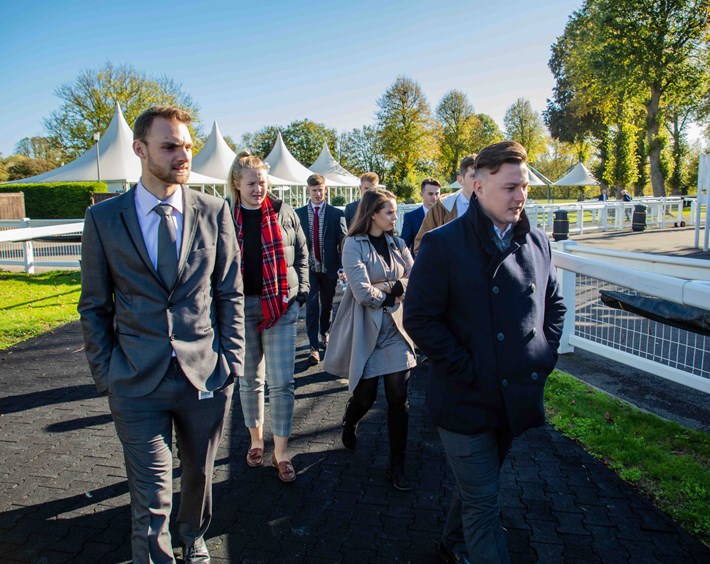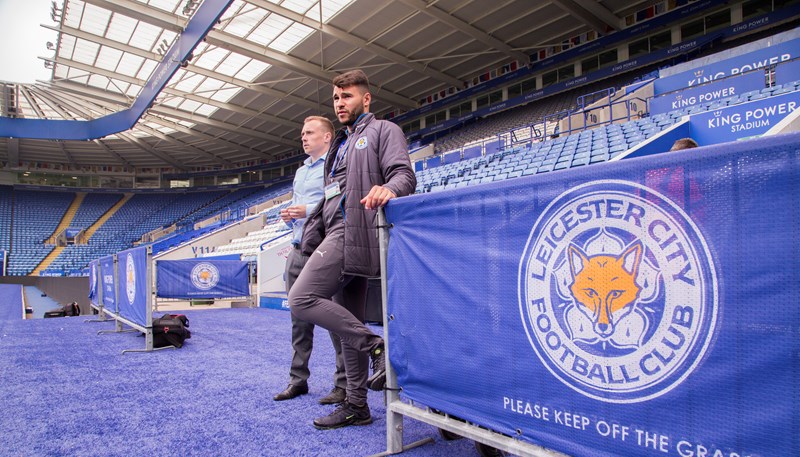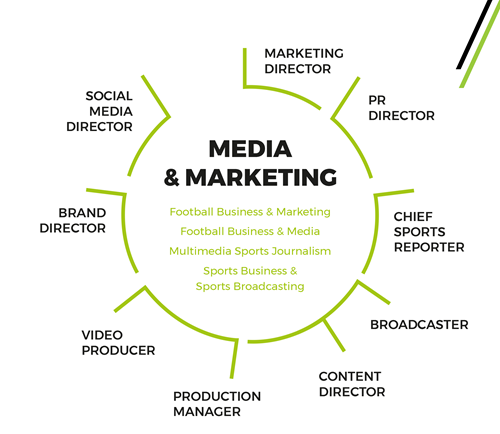Degree overview
Ideal for those seeking to work in the fast-growing, exciting sports broadcasting industry, this degree is designed for those aspiring for a career either in front of or behind the camera. Learning from UCFB’s experienced practitioners, this course will help you understand practices both on the field and in the studio. With access to first-class equipment and inspiring facilities, as well as visits from industry professionals, students are equipped with the tools to succeed in this thriving sector.
This course is available with a Foundation year for those who do not meet main entry requirements. Please see ‘Modules’ and ‘Entry Requirements’ sections on this page for further information, including UCAS codes.

Degree content
Together sports business and sports broadcasting are one of the biggest businesses in the world, and it is impossible to imagine one without the other. You will gain an understanding of the diverse levels of both sports business and broadcasting, including commercial, event day and sponsorship revenues of rights management and audience profile. Techniques will also be studied for studio and outside recording technologies or match commentary, match reports, television presenting and interviews.
You will have the opportunity to work with broadcasting specialists to understand practices both on the field and in the studio, with access to first class broadcasting equipment to enrich your learning experience. You will be taught by industry professionals who excel in areas such as professional journalism, freelancing and editing.
Teaching locations for this degree include:
In addition to our teaching locations, we also use specialist facilities throughout the academic year as well as additional facilities where required.

A sport specific education is important because it gives you the understanding of how sport works – there are so many different areas to consider within any sport as a business.
Modules
- Skills for Learning
- Mental Wealth
- Research Project
- Contemporary Issues in Sport
- Foundation of Media Practice
- Media Law and Application
- Industry Competencies (Mental Wealth)
- Understanding Sports Business
- Principles of Sports Broadcasting
- Sport, Media and Society
- The Business of Digital Media
- Broadcast Journalism
- Industry Readiness (Mental Wealth)
- Visual Storytelling
- Media Law
- Research Methods
- Audio Storytelling
- The Business of Sports Broadcasting
- Professional Project
- Documentary Storytelling
- Sports Commentary
- Industry Engagement (Mental Wealth)
- Digital Futures

University Campus of Football Business is an embedded college of the University of East London. All graduates will receive a degree from the University of East London.
Click here to download the course specification
- QAA Subject Benchmark Statement Communication, Media, Film and Cultural Studies (2019)
- QAA Subject Benchmark Statement Events, Hospitality, Leisure, Sport and Tourism (2019)
- QAA Subject Benchmark Statement Business and Management (2019)
Visit the QAA website to access each of these benchmark statements.
Entry requirements
- UCFB Wembley or UCFB Manchester Campus course code: SBBF
- Institution: U10
- Campus: W or E
- 64 UCAS tariff points or equivalent non-tariff qualifications
- GCSE Maths and English Language (Grade C/4 or above) or equivalent e.g. Functional Skills Level 2
- International applicants will be asked to pass the Academic IELTS test with a minimum overall score of 6.0 and no less than 5.5 in each of the four elements
All applications are reviewed on a case by case basis. If your academic achievements do not meet the minimum level required but you have considerable professional experience, please contact admissions@ucfb.com.
Please be aware that all applicants who do not hold British or Irish nationality will require a visa to study in the UK.
Our access to a UK Government Student Visa licence is currently being reviewed. This means we are unable to consider applications from any applicant who would require a student visa to study in the UK as we cannot issue a Confirmation of Acceptance for Studies (CAS).
If you are unsure whether you would need a visa to study in the UK, or for more information, please contact compliance@ucfb.com.
If you don’t hold a visa for the UK and would still like to study with UCFB, please consider Football Coaching (Distance with Attendance).
- UCFB Wembley or UCFB Manchester Campus course code: SBB1
- Institution: U10
- Campus: W or E
- 96 UCAS tariff points or equivalent non-tariff qualifications
- GCSE Maths and English Language (Grade C/4 or above) or equivalent e.g. Functional Skills Level 2
- International applicants will be asked to pass the Academic IELTS test with a minimum overall score of 6.0 and no less than 5.5 in each of the four elements
All applications are reviewed on a case by case basis. If your academic achievements do not meet the minimum level required but you have considerable professional experience, please contact admissions@ucfb.com.
Please be aware that all applicants who do not hold British or Irish nationality will require a visa to study in the UK.
Our access to a UK Government Student Visa licence is currently being reviewed. This means we are unable to consider applications from any applicant who would require a student visa to study in the UK as we cannot issue a Confirmation of Acceptance for Studies (CAS).
If you are unsure whether you would need a visa to study in the UK, or for more information, please contact compliance@ucfb.com.
If you don’t hold a visa for the UK and would still like to study with UCFB, please consider Football Coaching (Distance with Attendance).
We accept applications with advanced standing via our Advanced Prior Learning (APL) application process. Should you wish to apply for direct entry into Year 2 or Year 3 of one of our undergraduate degree programmes, you will be required to complete an APL application form and provide us with evidence of your previous studies.
Please contact admissions@ucfb.com for further detailed guidance. Please note that should you wish to apply via this process, we strongly encourage you to begin the application process early in the cycle and you will still be required to complete a UCAS application.
All applications for an undergraduate degree programme are submitted via UCAS. To apply, please visit UCAS.com.
Career prospects
This programme is geared towards those who wish to pursue a career in broadcasting, in front of or behind the camera. Huge TV deals are now commonplace in professional football, with each Premier League match now valued at over £10 million. Sport business and broadcasting simply go together. Potential career opportunities upon graduation include match day commentator, videographer, producer, project coordinator, media manager and content creation manager.

Over 90% of UCFB graduates are in employment within six months of graduating and almost two-thirds of them work within the global sports industry.
At UCFB we bridge the gap between education and business, allowing a unique approach to education. We provide two curricula; the academic curriculum which encompasses exams and coursework and the Employability & Career Planning programme – a three year journey of professional and personal development.
This provides access to best-in-class industry guest speakers, additional qualifications and exceptional opportunities to apply for work experience placements to ensure our students graduate as well-rounded, empowered professionals.
Find out more about your career journey at UCFB

Each of our UCFB undergraduate degrees is underpinned by an embedded strand of learning and skills development, including a formalised a short work-placement opportunity, to better equip students for the 21st century workplace and enhance employability opportunities.
This allows students to develop a set of key transferrable skills to ensure they are ready for the modern workplace when they graduate, including emotional, social, physical, cultural and cognitive intelligence, digital proficiency, industry and community connections, and giving back to the community through projects and volunteering.
Every UCFB degree has one Mental Wealth module in each academic year to cover these skills, and our learning outcomes for all modules are closely mapped to these same competencies in order to maximise graduate's industry readiness and career opportunities.
Lianna presents to 90,000 people each event day at Wembley Stadium to keep them entertained when the action isn't on the pitch.
Read more
As a BA (Hons) Sports Business & Sports Broadcasting student at UCFB, Paula Wood gained incredible media work experience at the likes of Tottenham Hotspur Women and QPR under-23s, something which now, alongside her degree after graduating in 2020, is standing Paula in good stead in her role as Talent Production Coordinator at Premier League Productions.
Read more
Fees
Visit our dedicated page about fees and student finance.
The provision of a facility or service including accommodation may be subject to an additional charge (i.e. separate from tuition fees). Where this is the case, we will make this clear in advance and payment for such service shall be made in accordance with any additional contract made between you and the University.
In some instances, optional activities provided by UCFB may carry an additional cost for participants (e.g. qualifications with external certification such as FA Coaching Badges). Any additional costs will be provided to students in advance of any such sessions running.
Students may need to buy a storage device, such as an SD card, to host their material. Costs for a SD or similar depend on the memory size. A typical 32GB card will cost around £10.
Students may also have to pay occasional travel costs towards attending ‘live brief’ events at football stadiums in the London area. London travel costs between £1.50 and £7 per journey depending on the number of zones and the time of day. Travel cards are also available.
UCFB has a range of scholarship and bursary options to help with the cost of studying and to encourage students to embrace their time at UCFB and graduate with more than just their university degree. Click here to learn more.

UCFB provides an exceptional environment to live and learn in, with state-of-the-art facilities in two inspirational campuses in London and Manchester.
Find out more

















